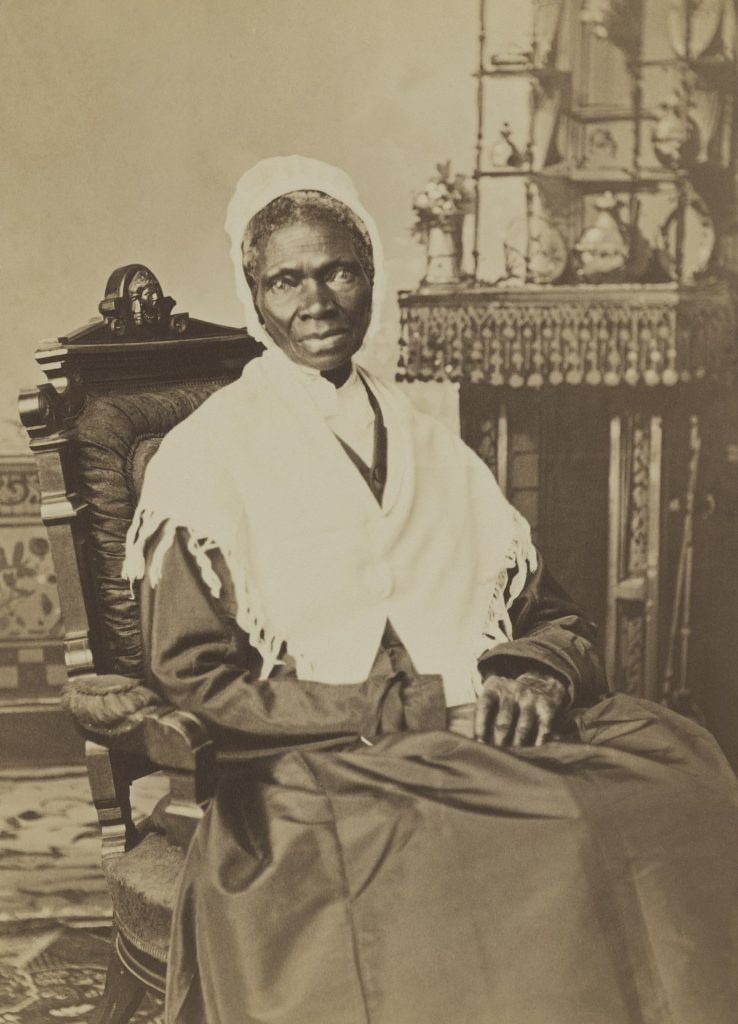
Tuesday
To celebrate the 100th anniversary of the amendment giving women the right to vote, I’ve been looking through Ain’t I a Woman: A Book of Women’s Poetry from Around the World (Wings Books, 1993). The title is taken from a speech delivered by former slave, abolitionist and suffragist Sojourner Truth, which Erelene Stetson has versified. Along with “Ain’t I a Woman” I’ve chosen poems by a Jamaican-American woman (in honor of Kamala Harris) and a Chinese woman.
Truth (1797-1883), an American giant, was actively involved in the 19th century women’s rights movement. Although no transcript exists of the speech she delivered at the Women’s Rights Convention in Akron, Ohio, in 1852, there were notes, which Stetson draws on for the following:
Ain’t I a Woman? That man over there say a woman needs to be helped into carriages and lifted over ditches and to have the best place everywhere. Nobody ever helped me into carriages or over mud puddles or gives me a best place… And ain’t I a woman? Look at me Look at my arm! I have plowed and planted and gathered into barns and no man could head me… And ain’t I a woman? I could work as much and eat as much as a man-- when I could get to it-- and bear the lash as well and ain’t I a woman? I have born 13 children and seen most all sold into slavery and when I cried out a mother’s grief none but Jesus heard me… and ain’t I a woman? that little man in black there say a woman can’t have as much rights as a man cause Christ wasn’t a woman Where did your Christ come from? From God and a woman! Man had nothing to do with him! If the first woman God ever made was strong enough to turn the world upside down, all alone together women ought to be able to turn it rightside up again.
Given that many of our most effective governors, legislators, mayors, state delegates, and others are women, Truth’s assertion is being borne out. To be sure, there are also many women, including my state’s junior senator Marsha Blackburn, that are as bad as any man. Gender doesn’t automatically make one special. Many women, however, are more interested in good governance than in ideology, which is a plus these days.
Few women have been as outspoken as Truth, and Jamaican-American poet Christine Craig talks about how much she owes to the silent women who came before her. While her “grandmothers and their mothers” could not openly declare “I, me, I am a free black woman,” nevertheless they
nourished and infused such a line,
such a close linked chain
to hold us until we could speak
until we could speak out
loud enough to hear ourselves
loud enough to hear ourselves
and believe our own words.
Craig says that though her foremothers had to play a “game of deference/ and agreement and pliant will,” their silence was a way to “compost up their strength”:
The Chain
I no longer care, keeping close my silence
has been a weight
a lever pressing out my mind.
I want it told and said and printed down
the dry gullies
circled through the muddy pools
outside my door.
I want it sung out high by thin-voiced elders,
front rowing murky churches.
I want it known by grey faces queuing under
greyer skies in countries waking
and sleeping with sleet and fog.
I want it known by hot faces pressed against
dust-streaked windows of country buses.
And you must know this now
I, me, I am a free black woman.
My grandmothers and their mothers
knew this and kept their silence
to compost up their strength,
kept it hidden
and played the game of deference
and agreement and pliant will.
It must be known now how that silent legacy
nourished and infused such a line,
such a close linked chain
to hold us until we could speak
until we could speak out
loud enough to hear ourselves
loud enough to hear ourselves
and believe our own words.
The last poem is by Ch’iu Chin (1879?-1907) and translated by Kenneth Rexroth and Ling Chung. I like the way it mentions women who have served as generals (“The wild strokes of their swords/Whistled like dragons and sobbed with pain”) and envisions a world in which the world will abandon “jewelled dresses and deformed feet”:
To the Tune “The River Is Red”
How many wise men and heroes
Have survived the dust and dirt of the world?
How many beautiful women have been heroines?
There were the noble and famous women generals
Ch’in Liang-yu and Shen Yun-yin.
Though tears stained their dresses
Their hearts were full of blood.
the wild strokes of their swords
Whistled like dragons and sobbed with pain.
The perfume of freedom burns my mind
With grief for my country.
When will we ever be cleansed?
Comrades, I say to you,
Spare no effort, struggle unceasingly,
That at last peace may come to our people.
And jeweled dresses and deformed feet
Will be abandoned.
And one day, all under heaven
Will see beautiful free women,
Blooming like fields of flowers,
And bearing brilliant and noble human beings.
Beautiful free women! That what these struggles are all about.